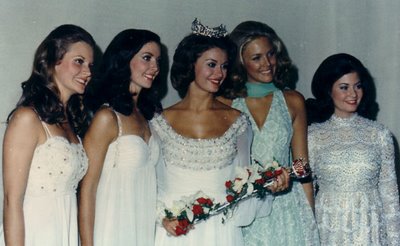
In the context of my summer course, I have been thinking a lot about the concept of mimesis, which my handy Microsoft Word dictionary defines as “the imitation of life or nature in the techniques and subject matter of art and literature.” My students have been working through Laura Mulvey’s argument on visual pleasure and narrative cinema, and I have been pushing them to specifically begin to question what it means to end our visual gratification, our unthinking scopophilia, when we analyze visual culture. In this sense, recognising mimesis as a technique is quite important, because it allows us to see the constructed and essentially ideological nature of representation, the scrim upon everything we “see,” especially in popular culture.
While I’m not sure if the Chronicle of Higher Education counts as popular culture for anyone outside the Royaume of Eggheads, this critical technique of mimesis, of recognising the constructed nature of representation, is notoriously hard to communicate to students, flooded as they are by images and messages and their own naïve sense of reading this wave. And it was to mimesis that my mind turned when I read in yesterday’s Chron an article by Gary A. Olson (for the column “Heads Up”) urging us, his fellow eggheads, to inculcate a culture of recognition in the university (NB: The article, posted in the Careers section, is not behind the Chron’s firewall).
The article is pithy and compassionate, with Olson urging faculty to reflect on how we can reward our colleagues and ourselves in an “economy of scarcity,” and how given the paucity of dollars in our little sinecures, praise is crucial. He writes:
[…] Even well-endowed institutions find themselves in a constant struggle to find enough money to do everything they want to do. That economy of scarcity extends to salaries: most academics and administrators are not compensated at the level that their education, skills, and experience would garner in business or industry.
In the absence of sufficient real capital, the cultural capital of the academic world -- recognition -- is especially important. We live for -- and thrive on (whether we admit it to ourselves or not) -- the recognition of our colleagues, peers, disciplines, and institutions. Strangely enough, however, institutions can be stingy when it comes to handing out praise. At times, it seems scarcer than dollars.
That is especially unfortunate because the longer someone's outstanding efforts go unacknowledged, the more that person is likely to become alienated.
This is an interesting passage, rich with meaning, and it's not like I have a beef with Olson's advocacy in general. I mean, who doesn't like being appreciated? But several things struck me at once about it, not the least of which is the Pollyannaish tone of this revelation, the hand wringing behind wondering why and how institutions can be stingy with, in this case, praise and recognition that are essentially free, right? Another would be the implication that salary (i.e. money) can make up for most horrible institutional situations (which I think is largely true, to a certain extent), and then replacing capital with recognition as the system of reward in the Shop.

To quote one of my favourite lines from Roseanne, “Are you new?” Why, pray tell, would institutions and colleagues be stingy when it comes to praise, why would they insist on hierarchies and lines of demarcation between units and staff in ways detrimental to the health of university life? One factor here seems to be that money and recognition tend to go hand in hand in the university, as elsewhere in our socio-economic lives. It is not that universities have no capital, and therefore replace capital’s values with a fuzzy but tangible concept of recognition. Negotiating skill and one’s institutional hotness factor, except in the most unionised institutions, are famous for leading to widely disparate rates of compensation for essentially the same (or lesser) work. Universities never have any money until, suddenly, they do. Course release, lower teaching loads, higher salaries, and larger start-up funds for certain faculty but not others have to come from somewhere (in other words: you, schmuck!), they are not neutral on the balance sheet of the institution. No, this simple division of the poverty of the university and the riches of Mammon is just not sufficient to capture what exactly is going on.
Olson is right in his observation that our academic culture of recognition is the fundamental basis of the profession, through peer review, evaluation, tenure and service. But he also seems to be channeling Eve Harrington in her utterance, “If nothing else, there's applause... like waves of love pouring over the footlights.” To paraphrase, we may not be rich, but we’re loved. One of Olson’s strangest and most disturbing examples is of a faculty woman who worked for 25 years to garner the respect of her colleagues. He writes,
A senior professor at a large public university told me a similar story. She felt ignored, even disrespected, by her colleagues despite making every effort to become a more integral part of her department. Eventually she abandoned all attempts to "join" her department and, for 26 long years, hunkered down and concentrated on her research, producing groundbreaking scholarship. Despite her fame, her departmental colleagues continued to dismiss her accomplishments. It was only when her university conferred on her the status of "university distinguished professor" that she felt part of the institution -- a full quarter of a century after she began her career there.
How absolutely pathetic! I mean, HELLO! Get the door! As the Voice would say, "Lady, you have issues"! Why would anybody be so masochistic? Get it together and get out of that dump, Mary! In my experience, recognition and fiduciary rewards are symbiotic. You publish, you make a “name” for yourself, you kiss the right ass, you ignore the right others, you bargain with your Dean or the roulette wheel of the academic job market, which is notorious for its basis in trend and hotness factor and sycophantic economies, and you come out on top. For some lucky few (including, in Olson’s example, those with the wherewithal and agency to recognise the necessity of moving on, clearly), it is a teleology of reward. For the rest of us, the relatively nameless and faceless drones, the structure of the university is apparent in our quotidian work lives, captured best by Margo Channing: “You are in a beehive, pal. Didn't you know? We are all busy little bees, full of stings, making honey day and night. Aren't we, honey?”

Olson’s concern that these disparities in recognition lead to alienation seems to be almost besides the point, or to put it down more sharply, to avoid the ethical dimensions of institutional justice. For his use of the term alienation has an emotive, fifties-like flavour here, along the lines of how do we go about solving the problem of teenage delinquency: individualistic, non-systemic, cosmetic. He calls for more recognition, for everything, in a manner that risks becoming like the current primary school policy of rewarding every child in games and contests because everyone is "special." When I was finishing my doctorate, I billeted with a faculty family with whom I became quite close, and their two young sons would regularly bring home, to my chagrin, certificates and plaques and ribbons, mostly for just showing up. “Oh, everyone got one,” they would say laconically, as they tossed whatever it was in some pile and ran off to burn the heads off Barbie dolls. Well, if everyone gets one, what is the point? Why bother? Oh, right, to make us all feel special. Even these boys, with their primordial six-year old brains, could see the ridiculousness of these rewards. These fuzzy politics of institutional “love” may indeed be valuable in the raising and education of children, but for those of us who are grown-ups, who can see the disparities between people in our work lives in material ways, the sop of a ribbon for everybody seems especially weak. Working actively towards economic justice in the academy seems to be more useful than divining new ways to make everybody feel special.

But the politics of recognition in the university are wrapped up in both economic and symbolic values. Olson cites the “stingy” nature of the reluctance to extend recognition to colleagues in the university, but really goes no further in exploring this phenomenon. Extending or refusing recognition is a game of power, played most often by those with something to prove or something to lose, and if you don’t know the rules of the game, you are toast. The simple fact of the matter is that colleagues and deans and provosts use the carrot and the stick in enforcing the accepted norms and guidelines of the institution and the profession.
Don’t make too much noise, be nice, be professional, work hard, don’t complain, respect your superiors, know your place, don’t rock the boat, don’t be too smart, don’t be too dumb. And if you get out of line, we will banish you from our conversations, from our dining rooms, from our collegiality, from promotion and advancement, from a decent office, from requested courses and times. You’ll be so over you’ll feel like Mariah after the breakdown. The implication here being that one has no choice over the matter. You got to play to stay. But why stay in a shithole? It’s like Mom’s truism: “If they treat you that way then they’re really not your friends anyway.” So true, but how do we forget this?
The stick is what, I think, most of us feel in our institutional lives, although we also taste the carrot, some more than others, but still. I am reminded of a recent thread at Confessions of Community College Dean on what makes a good Dean. Dean Dad writes:
How do you spot a lousy dean? It’s tough, since sometimes what looks like a lousy dean is, in fact, a capable manager dealt a crappy hand. Still, there are telltale signs. Is your dean prone to public displays of temper? Does s/he change direction on a dime? Does s/he play favorites? (NEVER NEVER NEVER do this.) Does s/he cut a lot of backroom deals? Have you caught her in a lie? (If so, did she ‘fess up?)
As you will know, my experience at Sadistic College was marked by a horrible Dean who exceeded all of the lowest expectations mentioned in Dean Dad’s post, and then some. But it wasn’t just the fact that the Dean of Sadistic College is a horrible manager, but that this management happened in the context of a remarkably sadistic culture of punition. The stick of punishment, of never being good enough “for us,” of “we hope you can stay,” was an institutional truism. What makes people stay in milieu like this? If I have to be truthful with myself, I probably would have stayed, had I not been shown the door.

A bird in the hand is better than two in the bush, even if the bird you have is dead and putrid. Is that really it though? What drives the academic to lump it and suffer, like Olson’s accomplished professor, hoping against hope for recognition? Could it be that Stanley Fish’s argument about academics is right, that we are masochists because it makes us feel better about ourselves, our sacrifices turning us into morally superior beings? But moreover, what cultural glitch, what retardation of civilization, what missed step in human evolution, legitimizes this approach? The unspoken ghost rattling its chains in Olson’s commentary regarding the withholding of recognition, present but unnamed, is both the human capacity for unkindness and specifically how that tendency plays out in the academy. People are mean, we know that, but so many of us can’t reach the point of drawing a line: I will eat shit until this point. As the Fierceness was once fond of saying about academia, “These motherfuckers want you to eat shit, and not only eat shit, but smile while you’re doing it.” And I think that’s about right, depressingly enough. I'm a realist: I know you have to eat some shit sometime to survive in any institutional context. But we don’t have to accept that bargain completely and exclusively, in spite of the fact that many of us feel trapped by the dialectics of labour, exploitation, and elusive agency, even as we attempt to resist this sadistic game. Humiliation is part of it, if not the game itself.
Recently, the fantabulous Sfrajett recounted a hasty exit from her office, trapped by a locked door on one side and a celebration party of which she wanted no part of on another. Her hilarious and poignant post speaks to the manner is which we have to negotiate the tricky spaces in which our presence is invisible, in which our labour goes unrecognised, in which we are expected to eat shit and like it. She writes:
The entire room is full of people chatting with their reception faces on. Earnest, leaning into their cake and napkins. I see to my horror that someone I used to know is in the room, talking away but facing the other direction, away from my door. An ex friend, the one who dropped me a while ago and who decided not to say hello to me in the hotel lobby at MLA (ok--to be fair, I decided then not to say hi either). Trapped! What can I do? Slink by in my damp and unflattering t-shirt, heavy, defeated? Me, the adjunct; her, next year's director of Gender Studies at Elite University, both of us the same age. Once we were young hopefuls. We double-dated with our respective spouses. I fed her cat when she went away, a lifetime ago.
[…]
It will be ok. Have.To.Get.Out.Now. I fumble with the lock, feeling like any minute someone will see me, stop me, and lead me back to the Room of Shame. Can't people see me? Isn't anyone wondering what I am doing here at the end of the hall? At last I slide the bolt across and fall out into the open air, choking with panic.

This Helen Lawson moment made me think of the many times I have avoided, often to comic effect (hiding in a bush to avoid someone is probably the most memorable), the enforced collegiality that masks the brutal power and economic dynamics of the Shop. While I would have wished that Sfrajett actually did pull a Helen Lawson, going out the way she came in after Neely O’Hara flushes her wig down the toilet, sometimes survival is all about making it through, not in a cinematic moment of glamour like Hollywood’s “shit-kicking Amazons,” in Daniel Harris’s memorable phrase, but in a more literal, practical way, to live to fight another day. Did I have a Helen Lawson moment at Sadistic College? Well, upon departure I didn’t trash my campus house and I didn’t shit on my desk (both actual incidents of other faculty shown the door), so I guess I did leave a decidedly unfair and uncomfortable situation as elegantly as I could, which is to say limping, wounded, upset, doubting. But as you can see, I have lived to see, and fight, another day. Quoting RuPaul, “Look at the Bitch now!” She has a job, she managed to keep the wonderful Mr. Gordo through the crap times, she has department and college colleagues who respect her, and who never, ever say “we HOPE you can stay” except in the sense that they hope I'm not on the market, and she is looking mighty fine with her summer extra-short buzzcut. Does this mean I am perfect? Certainly not, but it does mean I am now at a place where I am appreciated, recognised. There are better places, one just needs the gumption to get off their duff and go find them.
What Sfrajett’s narrative reveals is agency, the agency of refusal. The Vreeland aphorism of “Elegance is refusal” seems key here, but I think the reverse is true as well: Refusal is Elegance. And this is what I love about Sfrajett’s narrative, and all the moments in which we finally decide enough is enough, and more importantly act in our best interests. But this is a lesson that will never be learned through a ribbon for being special. I don't want a cheap certificate from a lying, cheating Dean, I want a more equitable workplace! The symbolic recognition the Shop offers us, in both its pleasures and pain, is not enough, for we must also have our eye on the material and ideological meanings of this recognition as well. This consciousness calls for action, of transformation or refusal, but action nonetheless.



5 comments:
If I had been able to carry my wig in my hand, aloft like the head of John the Baptist, perhaps I would have had the courage to make it a truly Helen Lawson moment. I guess the man she had waiting for her didn't care about her hair. For me it was live to fight another day, I guess. Thanks for giving me the honorary drag-queen-dignity-in-abjection moment anyway!
This is a great post, and there's much I want to comment on here. For the moment, I'll stick with the "why doesn't s/he leave?" question you posed, which sounds oh-so-much like the question we ask of those trapped in abusive (personal) relationships.
I can think of two reasons: (1) we've been beaten over the head with the idea that we are so LUCKY to have t-t jobs, because the job market is SO HORRIBLE (which it is), that we feel grateful even for the abuse. And (2) academics are essentially conservative, cautious creatures. We like games with rules we can see and understand (syllabi, tests, the tenure process). The thought of *leaving* academia is simply too much freefall, too much improvisation for our little brains to handle.
Nice. I guess the interesting question to me is how the various slights of the shit-eating-enjoyment nature are supported or not by the institutional structures, and what kinds of organisational remedies might be in place for those. I guess, when I have been inside large organisations, I've learnt some talent/cultural capital for the deal-making that you correctly characterise as integral to organisaitonal success. On the other hand, despite assiduous learning, those skills never quite worked as effectively as they do for people with the class background to feel at ease in the cultural space of that negotiation. Of course I wouldn't want to move the motivators for these slights to the unconscious, but I think there is some kind of factor in there that makes a good dose of Fanon pretty useful for understanding the game. That is, perhaps the more sadistic expressions, even as they are justified consciously, emerge from more troublesome fears and cultural processes that may not be comfortable or easy to disembed from the fundamental class structure of the university itself. In that respect, as you rightly critique Olson for the Polyannaism, it feels that your final call for an "action of refusal" picking up on Sfrjett's story might reinforce those Fishian masochistic tendencies at the expence of attention to the setting. Can we really divorce the game from the one we ask our students to play? To me they always felt related, as you captured in the dreaming spires series. How then do we carry ourselves when holding the carrot/stick, can we know? I guess I agree most with your point that it's about choosing a line and saying, "no more than this".
"why doesn't s/he leave?"
It sounds to me in this case the she didn't leave _academia_ because she was actually interested in it.
Why not leave her institution: there could be family and other such reasons, but I'll bet the most important was that there was no guarantee of better recognition elsewhere.
This is a good post, have you considered fixing it up as a journal submission???
Great post!
Post a Comment